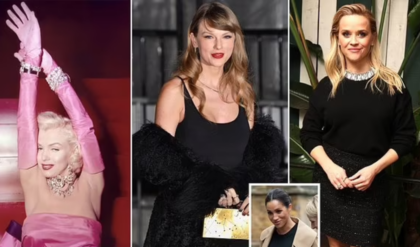
Taylor Swift has undoubtedly left an indelible mark on the music industry, captivating both fans and experts alike with her talent and influence. The phenomenon known as the “Taylor Swift Effect” has been the subject of considerable discussion, with analysts noting its impact on various aspects of culture and commerce.
For instance, the NFL experienced a significant boost in brand value, attributing $122 million to the “Taylor Swift Effect.” Additionally, sports analysts have even linked her association with Kansas City Chiefs tight end, Travis Kelce, to an increase in his popularity, describing him as “sizzling hot.”
Taylor Swift wears a mini skirt with Travis Kelce causing him to walk faster as she turns heads
One psychologist, Dr. Kim Gillbee, PhD, delved into Swift’s influence in an article titled “Taylor’s Totalitarianism: Psychologist Reveals 3 Controversial Insights into Swift’s Spellbinding Sorcery.” Dr. Gillbee’s analysis suggests that Swift’s songs, public demeanor, and dating history may indicate that she is “likely autistic.” While acknowledging the controversial nature of her assessment, Dr. Gillbee posits that Swift’s career could be impacted by these potential issues.
In her article, Dr. Gillbee emphasizes the unparalleled influence wielded by Swift, suggesting that conventional terms like “megastar” fall short in capturing her impact. However, she also expresses skepticism, stating, “Now, through my training and working with people for so many years, I’ve developed a pretty good bulls**t meter.” She proceeds to outline three controversial opinions regarding Swift’s persona.
The psychology behind the pop star’s mystique
The first opinion centers on Dr. Gillbee’s belief that Swift may be on the autism spectrum, a diagnosis she acknowledges cannot be definitively made without proper assessment. Drawing from clinical experience, Dr. Gillbee suggests that Swift’s songs and behavior align with characteristics commonly associated with autism, particularly in females. She notes Swift’s use of music as a coping mechanism for overwhelming emotions, suggesting a deeper connection to the human experience.
Furthermore, Dr. Gillbee discusses Swift’s hypermobility and hyperfocus, traits she perceives as indicative of her relentless pursuit of success from a young age. Despite criticisms of Swift’s continued portrayal of adolescent themes, Dr. Gillbee argues that these elements reflect a focused determination rather than immaturity.
Dr. Gillbee also examines Swift’s propensity for “masking,” a behavior common among females on the autism spectrum. She suggests that Swift’s ability to mimic social cues may contribute to her perceived normalcy in public interactions. Citing lyrics from Swift’s songs “Blank Space” and “Mirrorball,” Dr. Gillbee highlights instances where Swift references adaptability and conformity.
From autistic traits to vulnerable narcissism
Finally, Dr. Gillbee explores themes of vulnerability and narcissism in Swift’s music, drawing parallels to her own research on covert narcissism. She analyzes lyrics from Swift’s song “Anti-Hero,” suggesting that they reveal underlying insecurities and a desire for validation.
In conclusion, Dr. Gillbee’s analysis offers a multifaceted perspective on Taylor Swift’s persona, challenging conventional perceptions while acknowledging her significant impact on music and culture. Through her examination, Dr. Gillbee prompts further reflection on the complexities of celebrity influence and the intersection of psychology and pop culture.





